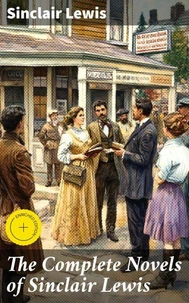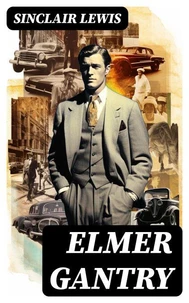Main Street & Babbitt. Exploring Small - Town Struggles and Middle - Class Dreams in Early 20th Century America
Par :Formats :
Disponible dans votre compte client Decitre ou Furet du Nord dès validation de votre commande. Le format ePub est :
- Compatible avec une lecture sur My Vivlio (smartphone, tablette, ordinateur)
- Compatible avec une lecture sur liseuses Vivlio
- Pour les liseuses autres que Vivlio, vous devez utiliser le logiciel Adobe Digital Edition. Non compatible avec la lecture sur les liseuses Kindle, Remarkable et Sony
 , qui est-ce ?
, qui est-ce ?Notre partenaire de plateforme de lecture numérique où vous retrouverez l'ensemble de vos ebooks gratuitement
Pour en savoir plus sur nos ebooks, consultez notre aide en ligne ici
- Nombre de pages800
- FormatePub
- ISBN859-65--4768448-0
- EAN8596547684480
- Date de parution02/12/2023
- Protection num.Digital Watermarking
- Taille1 Mo
- Infos supplémentairesepub
- ÉditeurGOOD PRESS
Résumé
In "Main Street" and "Babbitt, " Sinclair Lewis masterfully critiques American societal norms in the early 20th century through incisive character studies and vivid depictions of small-town life. "Main Street" follows the journey of Carol Kennicott, who struggles against the conformity and provincialism of her hometown, showcasing her intellectual aspirations and relentless desire for cultural enrichment.
In contrast, "Babbitt" centers around George F. Babbitt, a middle-class real estate broker whose life reflects the emptiness of consumerism and societal pressure, ultimately leading him to a quest for authenticity in a world rife with hypocrisy. Lewis employs a blend of realism and satire, creating an engaging narrative that reveals the complexities of American identity during the Jazz Age. Sinclair Lewis, the first American to receive the Nobel Prize in Literature, was profoundly influenced by his own Midwestern upbringing and the societal limitations he observed.
His works are often autobiographical, reflecting his critiques of materialism and conformity. By drawing upon his experiences, Lewis illuminates the struggles of individuals yearning for deeper meaning in a rapidly industrializing society, capturing the essence of American life with unparalleled insight. Both "Main Street" and "Babbitt" are essential reads for those interested in social commentary and the human condition.
Lewis's sharp observations and rich prose invite readers to reflect on their own lives within the cultural milieu, making these novels timeless in their relevance. An exploration of societal expectations and personal identity, this duo offers a profound understanding of the duality of American experience.
In contrast, "Babbitt" centers around George F. Babbitt, a middle-class real estate broker whose life reflects the emptiness of consumerism and societal pressure, ultimately leading him to a quest for authenticity in a world rife with hypocrisy. Lewis employs a blend of realism and satire, creating an engaging narrative that reveals the complexities of American identity during the Jazz Age. Sinclair Lewis, the first American to receive the Nobel Prize in Literature, was profoundly influenced by his own Midwestern upbringing and the societal limitations he observed.
His works are often autobiographical, reflecting his critiques of materialism and conformity. By drawing upon his experiences, Lewis illuminates the struggles of individuals yearning for deeper meaning in a rapidly industrializing society, capturing the essence of American life with unparalleled insight. Both "Main Street" and "Babbitt" are essential reads for those interested in social commentary and the human condition.
Lewis's sharp observations and rich prose invite readers to reflect on their own lives within the cultural milieu, making these novels timeless in their relevance. An exploration of societal expectations and personal identity, this duo offers a profound understanding of the duality of American experience.
In "Main Street" and "Babbitt, " Sinclair Lewis masterfully critiques American societal norms in the early 20th century through incisive character studies and vivid depictions of small-town life. "Main Street" follows the journey of Carol Kennicott, who struggles against the conformity and provincialism of her hometown, showcasing her intellectual aspirations and relentless desire for cultural enrichment.
In contrast, "Babbitt" centers around George F. Babbitt, a middle-class real estate broker whose life reflects the emptiness of consumerism and societal pressure, ultimately leading him to a quest for authenticity in a world rife with hypocrisy. Lewis employs a blend of realism and satire, creating an engaging narrative that reveals the complexities of American identity during the Jazz Age. Sinclair Lewis, the first American to receive the Nobel Prize in Literature, was profoundly influenced by his own Midwestern upbringing and the societal limitations he observed.
His works are often autobiographical, reflecting his critiques of materialism and conformity. By drawing upon his experiences, Lewis illuminates the struggles of individuals yearning for deeper meaning in a rapidly industrializing society, capturing the essence of American life with unparalleled insight. Both "Main Street" and "Babbitt" are essential reads for those interested in social commentary and the human condition.
Lewis's sharp observations and rich prose invite readers to reflect on their own lives within the cultural milieu, making these novels timeless in their relevance. An exploration of societal expectations and personal identity, this duo offers a profound understanding of the duality of American experience.
In contrast, "Babbitt" centers around George F. Babbitt, a middle-class real estate broker whose life reflects the emptiness of consumerism and societal pressure, ultimately leading him to a quest for authenticity in a world rife with hypocrisy. Lewis employs a blend of realism and satire, creating an engaging narrative that reveals the complexities of American identity during the Jazz Age. Sinclair Lewis, the first American to receive the Nobel Prize in Literature, was profoundly influenced by his own Midwestern upbringing and the societal limitations he observed.
His works are often autobiographical, reflecting his critiques of materialism and conformity. By drawing upon his experiences, Lewis illuminates the struggles of individuals yearning for deeper meaning in a rapidly industrializing society, capturing the essence of American life with unparalleled insight. Both "Main Street" and "Babbitt" are essential reads for those interested in social commentary and the human condition.
Lewis's sharp observations and rich prose invite readers to reflect on their own lives within the cultural milieu, making these novels timeless in their relevance. An exploration of societal expectations and personal identity, this duo offers a profound understanding of the duality of American experience.











